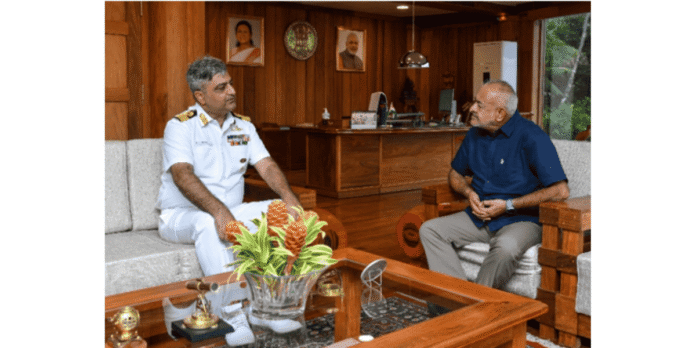The Andaman and Nicobar Islands witnessed a significant change in naval leadership this week as Commodore Prashant Handu, NM, relinquished charge after serving for more than 25 months as Naval Component Commander. His tenure came to a formal close with a farewell call on Admiral D K Joshi, PVSM, AVSM, YSM, NM, VSM (Retd.), Lieutenant Governor of the Islands and Vice-Chairman of the Islands Development Agency, at Raj Niwas.
The meeting underscored the collaborative relationship between the Naval Command and the local administration during Commodore Handu’s tenure. Admiral Joshi expressed gratitude for the Commander’s role in extending support to the Andaman and Nicobar Administration, a gesture that reflected the critical synergy between maritime security and civil governance in the strategically vital archipelago.
The Naval Component Commander plays a pivotal role in the defence and security structure of the Islands, which host India’s only tri-service theatre command. The Andaman and Nicobar Command (ANC) is tasked with overseeing maritime security in a region that is not only geographically closer to Southeast Asia but also central to India’s Indo-Pacific strategy. During his tenure, Commodore Handu supervised naval operations, coastal surveillance, and coordination with other defence wings, contributing to enhanced maritime preparedness.
Over the past two years, the Andaman and Nicobar Islands have continued to remain in the spotlight due to their geostrategic location. Situated at the crossroads of important sea lanes, the archipelago offers India both a challenge and an opportunity in terms of defence readiness. In this environment, the role of the Naval Component Commander has been crucial in ensuring effective coordination with the administration for civil-military cooperation, disaster preparedness, and support to local communities.
Commodore Handu’s term of more than two years saw consistent naval presence in the region, which is often regarded as India’s first line of defence in the Bay of Bengal and eastern approaches. The islands also serve as a key hub for monitoring maritime traffic and projecting India’s influence across the wider Indian Ocean.
His farewell meeting with Admiral Joshi reflected the mutual respect between the defence establishment and the civil administration. Admiral Joshi, as both Lieutenant Governor and Vice-Chairman of the Islands Development Agency, has a unique role in bridging governance and strategic imperatives. The acknowledgement of Commodore Handu’s support underscored the importance of sustained collaboration in ensuring that security measures complement developmental goals in the islands.

Leadership changes in the Andaman and Nicobar Command are closely watched, given the command’s unique status as a tri-service theatre. Each tenure brings its own focus areas, ranging from maritime domain awareness to coastal development support. Commodore Handu’s departure paves the way for a new phase in naval leadership, which will continue to build upon the established framework of cooperation with local authorities and maintain the islands’ pivotal role in India’s defence strategy.
While the identity of his successor has not yet been detailed in the official communication, the transition ensures continuity in the command’s objectives. The new leadership will be expected to carry forward the dual responsibility of enhancing maritime security and extending support to civilian authorities, especially in times of humanitarian need or natural calamities, which are not uncommon in the island territory.
For the people of the Andaman and Nicobar Islands, the Naval Component Commander’s office represents more than a military post; it symbolizes the commitment of the Indian armed forces to the region’s security, stability, and development. The farewell of Commodore Handu marks the close of one chapter while opening another in the evolving narrative of defence and governance in India’s eastern frontier.






